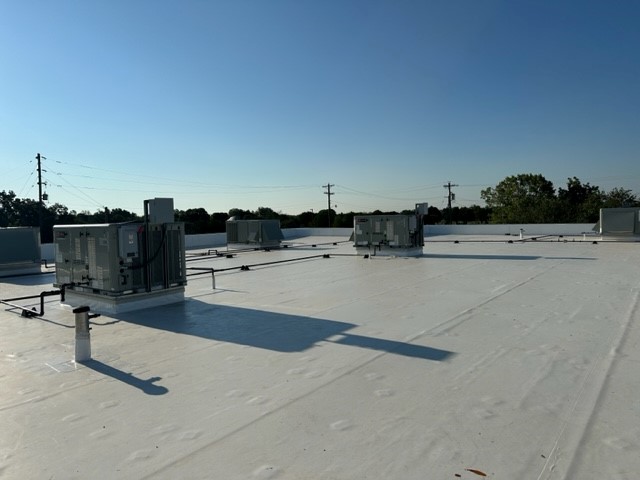For any commercial property manager or facility maintenance professional, the phrase “commercial roof repair” can often invoke a sense of immediacy and concern. A building’s roof is its first line of defense against the elements, a critical element in maintaining occupant comfort, and an important part of the structure’s energy efficiency profile. Choosing when to repair a commercial roof is not simply about fixing a visible issue; it’s a strategic decision that aligns with the broader goals of the business.
The Importance of Proactive Maintenace
Neglecting the upkeep of a commercial roof can lead to a host of problems – from internal water damage, mold, and structural decay to decreased energy efficiency and compromised indoor air quality. This is why learning when to perform a repair, and proactive maintenance, are critical skills for any property manager.
Signs That a Roof Repair is in Order
The first step in knowing when to repair a commercial roof is recognizing the signs that something is amiss.
- Interior Leaks: Witnessing leaks or water stains on interior ceilings or walls is a clear indication of a roof issue that needs attention.
- Exterior Damage: Visible damage to the exterior portion of the roof, such as loose or missing shingles, blistering, or crumbling, should prompt an immediate inspection.
- Increased Energy Costs: If there is a noticeable spike in energy bills, the roof’s role as an insulator may be compromised due to damage.
- Aging Concerns: For older roofs reaching the end of their expected lifespan, regular inspections are crucial to identify the need for repairs before major issues arise.
Creating a Maintenance Schedule
Developing and adhering to a maintenance schedule for the commercial roof ensures that potential issues are addressed before they become major headaches. This routine must include:
- Regular inspections,
- Clearing debris and inspecting drainage systems for blockages,
- Sealing any noticeable cracks or punctures,
- Monitoring the growth of moss or algae and having it removed,
- Keeping records of all inspections and repairs.
Understanding the Scope of Repair
Comprehending the scope of roof repair is more than just identifying the affected area. It involves understanding the types of materials used, the severity of the damage, and the expected longevity of the repair.
Material Matters
The type of material used in a commercial roof will affect repair techniques and longevity. Some common roofing materials include:
- Single-Ply Membrane: Typically made from rubber or thermoplastic materials. Repairs often involve sealing tears or replacing damaged sections.
- Modified Bitumen: An asphalt-based product that frequently requires heat sealing to make repairs.
- Metal: Durability is a key feature of metal roofs, so repairs tend to be less frequent and are often focused on mechanical fixings and sealants.
- Asphalt Shingles: The most common roofing material. Repairs can range from individual shingle replacement to resealing the entire surface.
Choosing the Right Professional
Not all roof repair companies specialize in commercial properties. M&R Roofing and Construction’s expertise in commercial roof repair is a strategic choice for property managers.
- Experience: M&R Roofing brings years of experience with various types of commercial roofs to ensure the repair is both effective and durable.
- Professionalism: Our team understands the need to minimize disruption to business operations during roof repairs.
- Licensed and Insured: Working with a licensed and insured contractor provides peace of mind and ensures the repair is completed to the highest standards and within regulations.
Long-Term Sustainability Through Repair
Opting for a repair instead of a full replacement can lead to long-term sustainability and financial benefits.
- Cost-Effectiveness: Depending on the damage, a repair can be more cost-effective than a full replacement.
- Environmental Impact: Extending the life of the roof through repair reduces the amount of waste going to landfills.
- Energy Efficiency: A properly repaired roof maintains peak energy efficiency, keeping HVAC costs down.
Maximizing the Longevity of Repairs
To ensure the repair extends the lifespan of the commercial roof, property managers should be proactive even after the repair is completed:
- Conduct regular post-repair inspections to detect any new issues.
- Address underlying concerns, such as poor insulation or outdated roofing systems.
- Keep detailed records of repairs and maintenance, helping to plan for the next cycle of upkeep.
The Golden Rule of Roofing: Maintenance and Monitoring
There is no one-size-fits-all approach to maintaining a commercial roof. Each building and its roof system are unique, requiring customized care. Maintenance and monitoring are ongoing practices that adapt to the changing needs of the roof and the business it serves.
Deploying Modern Technology for Monitoring
Utilizing modern technology can significantly aid in the monitoring process:
- Aerial drones equipped with thermal imaging sensors can provide a comprehensive assessment of the roof’s condition, even in hard-to-reach areas.
- Smart sensor technology can track and alert to changes in the roof’s structural integrity, especially in areas prone to frequent problems.
- Computerized systems can manage and schedule maintenance, ensuring no crucial inspection is overlooked.
Partnering for Long-Term Success
A strong, collaborative partnership with a trusted roofing contractor such as M&R Roofing and Construction is an investment in long-term roof health.
- Regular communication and a shared understanding of the building’s needs lead to timely interventions.
- Emergency repair services guarantee that unexpected issues are addressed quickly, avoiding further damage.
In Conclusion: The Timing of Repair is Everything
Knowing when to repair a commercial roof is as much an art as it is a science. It requires a proactive and strategic approach that balances the immediate needs of the building with long-term sustainability. M&R Roofing and Construction can be the strategic partner property managers need to make informed decisions about commercial roof repair. Through dedicated expertise, personalized care, and a commitment to excellence, we enable facility managers to safeguard their investments effectively.

